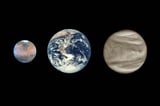The traditional explanation for rocky inner planets and large gaseous outer planets is that the outer planets are farther from the Sun, and therefore can hold onto large atmospheres that don't get eroded by the solar wind.
Okay so let's look at Venus. 30% closer to the Sun and has a much weaker magnetic field than Earth. So we would expect much less of an atmosphere, if any at all. But Venus' atmosphere is 92 times thicker than ours. How?
Now I know the Venusian atmosphere is 96% carbon dioxide, which is heavier than O2 or N2, so it's a little more "stalwart" against the solar wind. But honestly I don't see how that's enough. CO2 molecular weight compared to O2 is 44/32 = 1.375 times heavier. But again, Venus is 30% closer to the Sun and has an extremely weak magnetic field. Let's also not forget how darn hot Venus is, which means its air molecules are bouncing around much harder, making it easier for the solar wind particles to come along and knock out that CO2 into space.
Let's also not forget Mars, which also has an atmosphere 96% CO2 (very interesting why they are both 96%). But Mars' atmosphere is extremely thin, just a few hundred pascals. If the solar wind can do that all the way out to Mars, which is 2.1 times farther than Venus...then what is Venus doing with all that air?
Some things I tried to think of that make Venus different from Earth or Mars: Venus rotates extremely slowly. Venus rotates in the opposite direction. Venus has no moon(s). Venus has no water, no tectonic or volcanic activity, and no people. I don't see how any of this would help hold its atmosphere against the solar wind.
(Any joke comments on an extinct venusian people making foolish use of carbon fuels, hence the runaway greenhouse effect, 96% CO2, and cooked planet, will be met with skepticism.)
